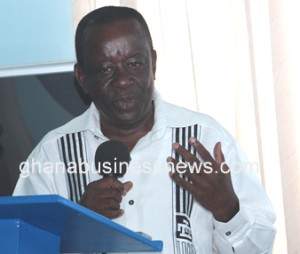National Security Strategy will safeguard economic security – Minister

Mr Albert Kan Dapaah, the Minister for National Security, says the coming into force of the National Security Strategy will promote multi-agency cooperation and safeguard the economic security of the State.
The Strategy, the Minister said, would open new channels of communication among actors tasked with the duty of enhancing domestic revenue mobilization and remove barriers that militate against efficient revenue collection.
“The Strategy will place the work of the Ghana Revenue Authority (GRA) at the very heart of all security considerations of the State, implying an enhanced cooperation between State Security and Intelligence Agencies and the Authority in preventing leakages,” he said.
Mr Dapaah said this on Wednesday at a sensitization workshop on the National Security Strategy for staff of the GRA in Accra.
Government in June, 2021 launched a National Security Strategy blueprint to enable stakeholders in the security sphere to deal effectively with existing, new and emerging threats to the country.
The Strategy is in line with nationally devised paths towards a proactive and inclusive coordinated response to internal and external security and stability challenges.
It is the product of four years of consultations with stakeholders including Parliament, the Ministries, Departments and Agencies, Civil Society Organizations and security experts, spearheaded by the National Security Ministry.
The Minister said the workshop was timely because it came at a time when economic security issues, resulting from the devastating effects of the COVID-19 pandemic, were threatening to disturb the peace and stability of the country.
He said developments which were recorded in the country such as increased agitations for the improvement in the living conditions of citizens leading to the emergence of pressure groups like fix the Country movement, and the recent gridlock in Parliament over the introduction of the E-levy, shed light on the magnitude of the economic security threats that confronted the country.
Mr Dapaah said these economic security threats were tightly connected to the ability of the State to generate revenues and tackle the socio-economic problems facing the country.
“In pre-pandemic times, it was prudent for developing countries including Ghana to rely on external borrowings to augment shortfalls in domestic revenues generated for development.”
“Today, that alternative is no longer attractive due to rising debt levels and the ballooning of deficits occasioned by the pandemic,” he said.
He said many countries in sub-Saharan Africa were exploring ways to widen the tax net and increase domestic revenue mobilization as the only potent means to restore their economies to normalcy and Ghana was no exception, even though these measures sometimes impose a certain degree of discomfort on the citizenry.
He said the government had implemented other measures such as the Immediate Tax Force and the Revenue, Assurance and Compliance Initiative to complement the efforts of the GRA in blocking revenue leakages, but the challenges still persisted due to limited cooperation from stakeholders.
Colonel Kwadwo Damoah (Rtd), the Commissioner of the Customs Division, GRA said the workshop would deliberate on the roles and responsibilities of the Authority in mobilizing revenue and the need to address any threats that would impede their work.
Source: GNA
